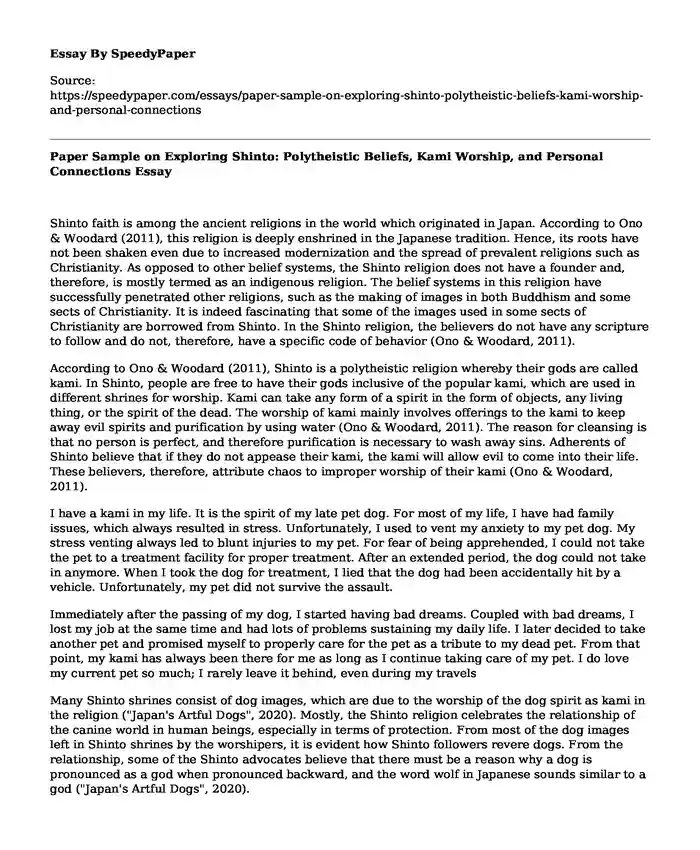
| Essay type: | Narrative essays |
| Categories: | Religion Personal experience |
| Pages: | 3 |
| Wordcount: | 613 words |
Shinto faith is among the ancient religions in the world which originated in Japan. According to Ono & Woodard (2011), this religion is deeply enshrined in the Japanese tradition. Hence, its roots have not been shaken even due to increased modernization and the spread of prevalent religions such as Christianity. As opposed to other belief systems, the Shinto religion does not have a founder and, therefore, is mostly termed as an indigenous religion. The belief systems in this religion have successfully penetrated other religions, such as the making of images in both Buddhism and some sects of Christianity. It is indeed fascinating that some of the images used in some sects of Christianity are borrowed from Shinto. In the Shinto religion, the believers do not have any scripture to follow and do not, therefore, have a specific code of behavior (Ono & Woodard, 2011).
According to Ono & Woodard (2011), Shinto is a polytheistic religion whereby their gods are called kami. In Shinto, people are free to have their gods inclusive of the popular kami, which are used in different shrines for worship. Kami can take any form of a spirit in the form of objects, any living thing, or the spirit of the dead. The worship of kami mainly involves offerings to the kami to keep away evil spirits and purification by using water (Ono & Woodard, 2011). The reason for cleansing is that no person is perfect, and therefore purification is necessary to wash away sins. Adherents of Shinto believe that if they do not appease their kami, the kami will allow evil to come into their life. These believers, therefore, attribute chaos to improper worship of their kami (Ono & Woodard, 2011).
I have a kami in my life. It is the spirit of my late pet dog. For most of my life, I have had family issues, which always resulted in stress. Unfortunately, I used to vent my anxiety to my pet dog. My stress venting always led to blunt injuries to my pet. For fear of being apprehended, I could not take the pet to a treatment facility for proper treatment. After an extended period, the dog could not take in anymore. When I took the dog for treatment, I lied that the dog had been accidentally hit by a vehicle. Unfortunately, my pet did not survive the assault.
Immediately after the passing of my dog, I started having bad dreams. Coupled with bad dreams, I lost my job at the same time and had lots of problems sustaining my daily life. I later decided to take another pet and promised myself to properly care for the pet as a tribute to my dead pet. From that point, my kami has always been there for me as long as I continue taking care of my pet. I do love my current pet so much; I rarely leave it behind, even during my travels
Many Shinto shrines consist of dog images, which are due to the worship of the dog spirit as kami in the religion ("Japan's Artful Dogs", 2020). Mostly, the Shinto religion celebrates the relationship of the canine world in human beings, especially in terms of protection. From most of the dog images left in Shinto shrines by the worshipers, it is evident how Shinto followers revere dogs. From the relationship, some of the Shinto advocates believe that there must be a reason why a dog is pronounced as a god when pronounced backward, and the word wolf in Japanese sounds similar to a god ("Japan's Artful Dogs", 2020).
References
Japan's Artful Dogs. (2020). Retrieved 13 September 2020, from https://thebark.com/content/japans-artful-dogs
Ono, S., & Woodard, W. P. (2011). Shinto The kami way. Tuttle publishing.
Cite this page
Paper Sample on Exploring Shinto: Polytheistic Beliefs, Kami Worship, and Personal Connections. (2023, Dec 13). Retrieved from https://speedypaper.net/essays/paper-sample-on-exploring-shinto-polytheistic-beliefs-kami-worship-and-personal-connections
Request Removal
If you are the original author of this essay and no longer wish to have it published on the SpeedyPaper website, please click below to request its removal:
- Martin Luther King - Essay Sample
- Personal Strengths and Weaknesses Essay Example for Students
- Research on National Intelligence Challenges. Essay Sample.
- Annotated Bibliography Example: Effects of Environmental Factors on Women's Reproductive Health in the US
- Commentary - Free Essay Example
- Personal Reflection on Language. Free Essay Example
- Paper Example. Barack Obama's Psychobiography
Popular categories




